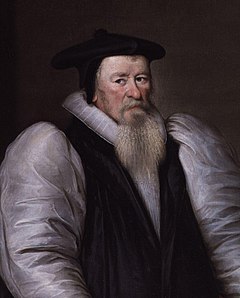John Thornborough
 | |||
| Data urodzenia | 1551 | ||
|---|---|---|---|
| Data śmierci | 1641 | ||
| Wyznanie | anglikanizm | ||
| Kościół | |||
| |||
John Thornborough (ur. 1551, zm. 1641) – angielski biskup anglikański.
Życiorys
John Thornborough urodził się w Salisbury[1]. Jego ojcem był Giles Thornborough[1]. Ukończył Magdalen College w Oksfordzie. Najpierw, 1 kwietnia 1573 uzyskał bakalaureat[1], następnie 27 czerwca 1575 magisterium[1]. Był kapelanem hrabiego Henry'ego Herberta, hrabiego Pembroke[1], a potem królowej Elżbiety I Wielkiej[1]. Następnie był dziekanem Yorku[1] i biskupem kolejno Limerick (1593)[1], Bristolu (1603)[1] i Worcester (1617)[1]. W tej ostatniej diecezji był następcą Henry'ego Parry'ego. Wyróżniał się tolerancją wobec purytanów, którzy z niechęcią odnosili się do kościoła episkopalnego. Zmarł w 1641 roku i został pochowany w katedrze w Worcester[1]. Był dwukrotnie żonaty. Z pierwszego małżeństwa miał dwóch synów, Benjamina i Edwarda[1]. Z drugiego związku z Elizabeth Bayles z Suffolk, miał syna Thomasa[1].
Dzieła
John Thornborough był autorem dzieła o tematyce alchemicznej, zatytułowanego Lithotheorikos[1], wydanego w roku 1621[2]. Oprócz tego napisał traktaty historyczne i teologiczne, w tym rozprawę o Eucharystii The Last Will and Testament of Jesus Christ, touching the Blessed Sacrament of his Body and Blood (1630).
Przypisy
- p
- d
- e
|









